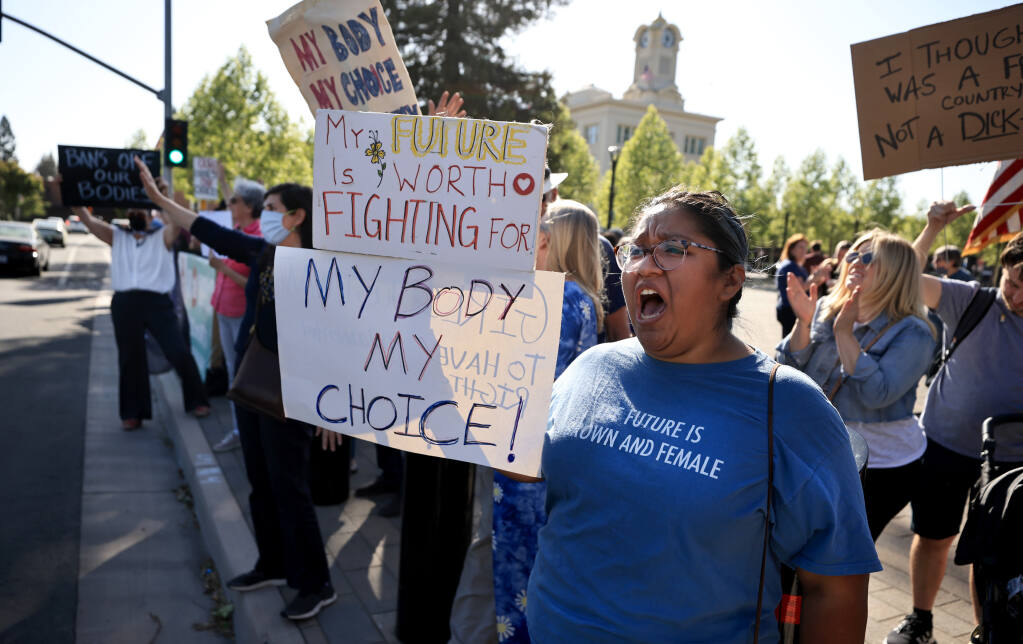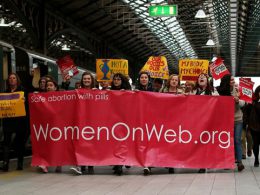Statement by ROSA International and International Socialist Alternative
Lawyers being brought in before treating ectopic pregnancies. Cancer patients denied life saving treatment because they are pregnant. Sexual assault victims in the emergency room denied the morning after pill. Within weeks of the overturning of Roe v Wade, the dystopian reality of an abortion ban for all pregnant people is exposed in the US. The worldwide impact has been sharp: on the one hand people across the globe are looking on in horror, on the other hand the far right are salivating to impose similar abortion bans in countries across Europe, Latin America and beyond.
The fight for control over women and pregnant people’s bodies is intensifying worldwide, with abortion rights under attack in countries from China to Italy to Hungary to the US. At the same time, mass mobilisations on the street have won real gains in terms of abortion access — just look at the victories in Ireland, South Korea, Argentina, Mexico, Colombia among others. While the feminist movement that has swept the globe over the last 10 years is fighting for bodily autonomy, a section of the right-wing elites has made driving back abortion access a key part of their programme. Yet polls in country after country indicate that the majority of people have no issue with abortion being accessible. So why are these reactionaries so intent on polarising this issue?
Anti-choice hypocrites
First, let’s call out their breath-taking hypocrisy. The hard right is not “pro-life”. These are the same people responsible for letting refugee children drown in the Mediterranean, the forced sterilisation of Uyghur women, horrific rhetoric targeting and endangering the lives of LGBTQ people, aiding and abetting a baby food crisis that gripped the US all summer. With their actions, the right-wing establishment have proven over and over again they don’t care if people die. The recent abortion attacks confirm this once again — we all know that making abortion harder to access doesn’t stop abortions from happening, it just puts pregnant people more at risk[1].
So what is the real reason for these attacks? And how can we fight them successfully? Why is a section of the ruling class so set on rolling back our right to bodily autonomy? These attacks have to be seen in the broader context of the multiple crises of capitalism globally, all of which impact on the ability of people to have real freedom in their decision whether to have children or not. A new global economic crisis is threatening profits, which has section of the elite worried about finding enough cheap labour. The cost of living crisis which is hitting working class people on all continents is putting the choice of having children even further out of reach for a new generation. The climate crisis is displacing millions from their homes, creating a new refugee crisis. War and conflict are forcing women and children into dire and vulnerable circumstances far away from home. The social care crisis has reached tipping point with education systems in many countries at the point of collapse and the Covid crisis has already exposed that health systems are at breaking point. Add to that the crises of gender violence, systemic racism, attacks on trans and LGBTQ rights — the list is endless.
The ruling class isn’t interested in or capable of addressing any of these systemic failures. Some of them may call themselves feminist or “woke”, but in reality they cannot be relied upon to fight for real bodily autonomy or real change. They may agree with access by law, but will never fight with us for access in reality — safe, free, legal abortion.
Misogynistic capitalism
At heart it is in the interest of the establishment to maintain the status quo, or more specifically protect their profits and their wealth. Undermining women’s bodily autonomy has benefits for them. Economically, as in countries like China the ruling class is worried about falling birth rates and their continued supply of cheap labour. Ideologically, as the rhetoric around “traditional family values” tries to force women further back into the role of unpaid carer, allowing for even more stripping of investment in essential services such as health and education and eroding working conditions and pay in those sectors.
Who benefits from all this first and foremost is clear: inequality has never been bigger in history! The world’s ten richest men more than doubled their fortunes from $700 billion to $1.5 trillion —at a rate of $15,000 per second or $1.3 billion a day— during the first two years of a pandemic, that has seen the incomes of 99 percent of humanity fall and over 160 million more people forced into poverty[2]. Worldwide unpaid labour in the home is now worth over $10 trillion per year and increasing.
But the ideological impact of a push back to “traditional family values” goes much further than that — with its hypocritical sexual mores it questions and undermines women’s and LGBTQ people’s sexuality and further encourages sexist and homophobic attitudes.
The fight around abortion rights is part of a much broader fight over bodily autonomy and equality for all regardless of sexuality or gender. Any policing of our bodies highlights how much the struggle of trans people and women are linked — we are the first ones to pay the price for policies and ideologies that try to force us to live our lives controlled by rigid, outdated gender and sexual norms that don’t correspond to our aspirations for freedom over our own bodies but are used to undermine and even silence broader trans, LGBTQ and women’s struggles alike.
Abortion bans don’t stop abortions from happening. What they DO mean is enormously increase the stress and financial burden on people with crisis pregnancies. Those who can afford it, will just travel to where abortion is legally available. Those who can’t afford it, are stuck looking for help in other ways. Abortion pills, now safely used worldwide by millions of women at home (legally or illegally), were first “discovered” by women in the favellas of Latin America — pregnant people who couldn’t afford other means of procuring an abortion.
10 years since Savita’s death
Abortion bans also create a horrific “chill effect” in maternity care in general and therefore place the medical care of all pregnant people at risk. The tragic and deadly consequences of this can be found in any country with an abortion ban. In Ireland the horrific treatment of Savita Halappanavar, 17 weeks pregnant when she miscarried and died of sepsis due to the unwillingness of the medical establishment to intervene, started a mass movement on the streets to overturn the abortion ban. Her story resonated with people so strongly because it reflected the fear all pregnant people in Ireland felt of not being heard and their body not being respected by a medical establishment that was too busy to be afraid of the law to really listen to pregnant people and value their lives over legal concerns.
Abortion bans are dangerous for pregnant people and disproportionately impact those most exploited and oppressed — so how do we fight back against them and build a movement that achieves free, safe and legal abortion accessible to all who need it?
The mass mobilisations on the streets we have seen in countries such as Ireland, South Korea, Argentina and Mexico give us a starting point. In all of those countries victories were won regarding abortion access, and they were won first and foremost by a grassroots movement pushing the issue onto the political agenda by mobilisations on the street. They put unrelenting pressure on the political establishment to force them to take action. Each of those movements took inspiration and learned lessons from what was happening in other countries — more than ever the fight for bodily autonomy is international.
In Ireland, Rosa and the Socialist Party played a very active role in the movement for a repeal of the constitutional ban and took initiatives that were key in achieving abortion on request up to 12 weeks in the public health system. That achievement was rooted in basing ourselves on the growing pro-choice sentiment in the broader working class rather than the feeble “pro-Repeal” utterings of the liberal establishment figures, who promised us Repeal “in the next 20 years”!
We helped build a movement that activated the broad support on the streets in mass demonstrations, days of action, petitioning, street stalls, using every opportunity to increase the political pressure. With broad support, Rosa organised public defiance of the constitutional ban by organising high profile abortion bus and assisted in making abortion pills safely available. By making the use of abortion pills by thousands of women a year a publicly known fact, we forced the hand of the establishment — any legislation would have to take this reality into account and allow for free, safe, legal abortion on demand up to at least 12 weeks.
However, the recent attacks on abortion access also have an impact globally. In particular, the defeat of Roe v Wade in the US has been followed worldwide and has already emboldened the far right in countries like Italy and Hungary.
The defeat of Roe v Wade wasn’t a lighting strike — it was a deliberate and highly motivated attack prosecuted by a significant section of the Republican Party. Hollowing out abortion access and legal rights over years laid the groundwork for this defeat. As significant is the complete lack of response by the rest of the establishment — Democrats have been promising to legislate for Roe v Wade for 40 years but never did anything about it. NGOs and family planning organisations tied to the Democratic Party didn’t learn the lessons from other countries that abortion rights can only be defended/won by active organisation from below and instead continue to put their fate into the hands of the same party that has proven to be unwilling to fight on this issue for 40 years! The result was that when Roe v Wade came under attack, the bankruptcy of a “leadership” beholden to the democrats, without a clear programme or strategy and paralysed by lack of action, became painfully clear. The day Roe was overturned, in many cities Socialist Alternative was the organisation who organised protests to turn the palpable anger of so many onto the streets.
Despite this lack of leadership, abortion access continues to be a huge political issue in the US — to the point that it has transformed the upcoming mid-term elections. Polling indicates support for abortion access has increased across the US since the High Court ruling. Women are registering to vote at an incredible rate. In states like Arizona and Pennsylvania, Republican candidates already had to walk back their hardline anti-abortion stance under pressure from the electorate — the elections are seen as a first battle ground to push the anti-choice agenda back.
But this won’t be enough to win a real victory. In order to decisively push back the right-wing agenda, we need to organise and bring together working-class communities and galvanise the anger into a movement with a clear strategy and programme.
The victory won in Seattle by Socialist Alternative and Council member Kshama Sawant is an excellent example of the type of strategy we need. The campaign made Seattle the first abortion sanctuary city in the country — an important victory all by itself and in its timing, proving that the defeat over Roe v Wade doesn’t mean the end, but can be the beginning of a fight back that grows into a significant US wide movement with majority support from ordinary people.
Sanctuary city won with fighting approach
Socialist Alternative won this victory by building pressure from below, mobilising working-class people in Seattle and by using our public office to represent this pressure in the most effective way possible. Petitioning voters, organising speak outs at the council meetings and a clear proposal regarding what is needed to be an effective abortion sanctuary city (including defying arrest warrants) led to a vote where the local Democrats felt they had no choice but to support the initiative.
This is an example of the type of strategy we need. A strategy that is built on the real power of building an active mass movement on the streets and in the communities willing to defy abortion bans because the active support for such defiance has been organised. A movement that demands — not asks — without illusions that politicians place pregnant people’s health before the ideological ramblings of the far right. A movement that is rooted in independent working class action and representation.
Such a movement bases its programme on what is needed to actually improve real reproductive choice for working class people. Free, safe and legal abortion, yes, but also free healthcare, including accessible gender affirming care, free childcare and economic and housing security.
Socialist feminist struggle
When looked at in that broader context, the type of measures that are needed to achieve bodily autonomy in a real way, it becomes clear that the establishment politicians cannot be trusted to fight for us.
This programme can only be achieved by challenging the status quo, by fighting for an economic policy which places the needs of people before the profits of the very few. That means a fight over who controls and owns those resources — healthcare not for profit but democratically owned and controlled by the communities who use it. Not speculative housing bubbles lining the pockets of big developers but public housing with rent controls and security of tenure.
It means building a movement that brings together ALL those who would benefit from any and all of such measures — the huge majority of us, the working class in all its variety– so we are strong enough to challenge a capitalist system that lurches from crisis to crisis, forever trying to make us pay the price for them. Capitalism as a system has failed us — to give us basic security, to provide for our basic needs and aspirations, even to give us control over our own bodies. Our fight for bodily autonomy also needs to clearly point out the culpability of the system — our fight is an anti-capitalist fight. The huge resources globally that are currently hoarded away by a tiny cabal of private profiteers could be used to start addressing the many problems this system has left us with, but only if we take them into democratic public ownership.
A socialist society is based on the understanding “from each according to their ability, to each according to their need” — solidarity, basic humanity and respect for every one of us. That is the basis for a society in which bodily autonomy can truly be achieved. If you want to help us build this socialist alternative, join us!
International Safe Abortion Day is on 28 September. It is very clear we need to turn this day into a day of international protests, demanding our right to bodily autonomy is respected everywhere in the world. Rosa and ISA are organising and participating in local protests across the globe — come along.
[1] Each year, around seventy-three million abortions take place worldwide, according to the World Health Organization & 4.7–13.2% of maternal deaths can be attributed to unsafe abortion (WHO). This translates to about thirty-nine abortions per one thousand women globally, a rate that has stayed roughly the same since 1990. Notably, rates have diverged between countries with fewer restrictions and those with more: Between 1990–94 and 2015–19, the average abortion rate in countries with generally legal abortion (excluding China and India) declined by 43 percent. By contrast, in countries with severe restrictions on abortion, the average abortion rate increased by around 12 percent. https://www.cfr.org/article/abortion-law-global-comparisons
[2] Oxfam briefing “Inequality kills”, 17 January 2022












